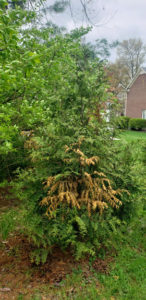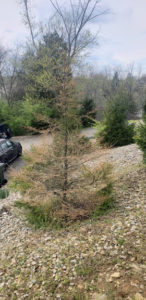
7:00 AM reading at Cheviot OH 3W on April 16, 2020
As I write this, my National Weather Service issued thermometer reads 23.8 degrees Fahrenheit at Cheviot OH 3W after a low of 25.6 degrees Fahrenheit yesterday. This after I already accumulated 319 growing degree days and had gone 23 days since the last 32 degree Fahrenheit temperature. All this adds up to what I expect will be significant damage horticulturally this year, short term and possibly long term for some plants.

Phenology is the study of how plant progression and insect emergence is correlated to degree day accumulation. At 319 growing degree days, springtime is rocking and rolling and a deep freeze can be quite damaging.
Trees go through a hardening off process going from the warm growing season into winter. Cells dehydrate some and the trees go into a state where cells will not freeze and burst. As growing degree days accumulate in spring, those cells re-hydrate, sap flows, buds open and new growth commences. The problem is that the further plants progress along this spring progression the less able they are to tolerate cold and freezing temperatures.
When temperatures dip below freezing for an hour or two, there is not enough time for cells to freeze and be damaged. The longer the temperature is below freezing and the farther the temperature descends into the 20’s, the greater the potential for damage.
I would consider Japanese maple to be the most tender tree when it comes to these late freezes. Most Japanese maples had leafed out and commenced spring growth this spring. I saw damage yesterday and I expect more today as the temperature is actually colder this morning. The low this morning is actually close to normal for the coldest morning in mid-winter.
Nature is nature. It is hard to say for sure exactly how damaging this freeze will be. My white blooming crabapple turned brown yesterday morning. I doubt it will suffer more that aesthetic damage. I saw red maple shade trees which looked brown yesterday. That may just be frozen “helicopter” seeds. Some fruit trees had come into bloom. This freeze may freeze blossoms and decrease the summer harvest. We shall see. And woe to those who took the bait and planted tender summer annuals. Prepare to replace them.
The other thing I am seeing this spring is dead Norway spruce trees and dead areas in arborvitae. Why? Remember the hottest September on record in 2019 and the hottest October day on record, along with a 30 day period with only 0.12 inches of rain? That heat and severe drought caused a lot of damage, some we are seeing and some which may subtly show up for years.
So, be aware when you see sickly looking plants that there is a reason, and the reason is likely at least in part meteorological.



